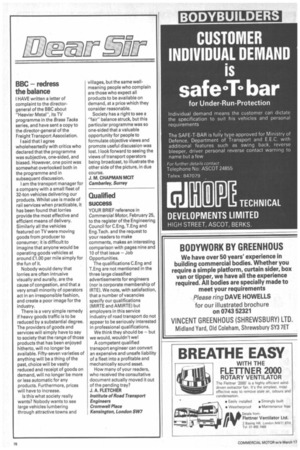LI (Em o7 ZI T
Page 80

If you've noticed an error in this article please click here to report it so we can fix it.
BBC — redress the balance
I HAVE written a letter of complaint to the directorgeneral of the BBC about "Heavier Metal", its TV programme in the Brass Tacks series, and have sent a copy to the director-general of the Freight Transport Association.
I said that I agree wholeheartedly with critics who declared that the programme was subjective, one-sided, and biased. However, one point was somewhat overlooked both in the programme and in subsequent discussion.
I am the transport manager for a company with a small fleet of 32-ton vehicles delivering our products. Whilst use is made of rail services when practicable, it has been found that lorries provide the most effective and efficient means of delivery. Similarly all the vehicles featured on TV were moving goods from producer to consumer; it is difficult to imagine that anyone would be operating goods vehicles at around £1.00 per mile simply for the fun of it.
Nobody would deny that lorries are often intrusive visually and aurally, are the cause of congestion, and that a very small minority of operators act in an irresponsible fashion, and create a poor image for the industry.
There is a very simple remedy if heavy goods traffic is to be reduced by a substantial degree. The providers of goods and services will simply have to say to society that the range of those products that has been enjoyed hitherto, will no longer be available. Fifty-seven varieties of anything will be a thing of the past, choice will be vastly reduced and receipt of goods on demand, will no longer be more or less automatic for any products. Furthermore, prices will have to increase.
Is this what society really wants? Nobody wants to see large vehicles lumbering through attractive towns and villages, but the same wellmeaning people who complain are those who expect all products to be available on demand, at a price which they consider reasonable.
Society has a right to see a "fair" balance struck, but this particular programme was so one-sided that a valuable opportunity for people to formulate objective views and promote useful discussion was lost. I look forward to seeing the views of transport operators being broadcast, to illustrate the other side of the picture, in due course.
J. M. CHAPMAN MCIT Camberley, Surrey
Qualified success
YOUR BRIEF reference in Commercial Motor, February 25, to the register of the Engineering Council for C.Eng, T.Eng and Eng.Tech. and the request to your readers to make comments, makes an interesting comparison with pages nine and 10 of that issue — Job Opportunities.
The qualifications C.Eng and T.Eng are not mentioned in the three large classified advertisements for engineers (nor is corporate membership of IRTE). We note, with satisfaction, that a number of vacancies specify our qualifications (MIRTE and AMIRTE) but employers in this service industry of road transport do not appear to be seriously interested in professional qualifications.
We think they should be — but we would, wouldn't we!
A competent qualified transport engineer can convert an expensive and unsafe liability of a fleet into a profitable and mechanically sound asset.
How many of your readers, who received the consultative document actually moved it out of the pending tray?
J. A. FLETCHER Institute of Road Transport Engineers Cromwell Place Kensington, London SW7
















































































































